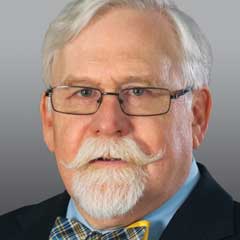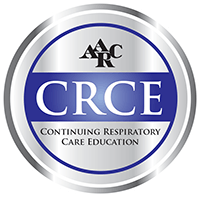AARC Pre-Course
Maximize your attendance by registering for the Research and Publication in Respiratory Care pre-course, presented by the AARC on Monday, July 25, 2022, the day before Summer Forum begins. Approved for 4.00 hours of continuing education credits (CRCE). Sign up for this FREE pre-course when you register for the Summer Forum event.
Monday, July 25, 1:00 p.m.–5:00 p.m.
Research and Publication in Respiratory Care
In this half-day symposium, Respiratory Care staff will present a series of short lectures related to research and publication. The primary goal of this program is to stimulate more respiratory therapists to perform research and submit their work for publication in Respiratory Care. A secondary goal is to teach respiratory therapists to be good consumers of the literature.
1:00 p.m.–1:15 p.m.
Welcome and Overview; Why Research is Important
Dean Hess, PhD, RRT

Establishing a scientific basis is important for the longevity of the profession. This presentation presents the reasons that research is important to optimize patient outcomes and establishing the scientific basis for the profession.
1:15 p.m.–1:35 p.m.
The Randomized Controlled Trial
Jie Li, PhD, RRT

The multi-center randomized controlled trial is the crème de crème of clinical research. This presentation provides an overview of the randomized control trial and describes the advantages and disadvantages of this research design. Also included are advantages and disadvantages of parallel designs versus crossover designs. The CONSORT recommendations for reporting randomized trials are introduced.
1:35 p.m.–1:55 p.m.
Observational Studies and Retrospective Studies
Dean Hess, PhD, RRT

This presentation compares observational studies to randomized controlled trials. Prospective and retrospective study designs are compared. Advantages and disadvantages of this study design are discussed. Also included are before and after studies (historical controls) that are commonly used to improve the quality of care. The STROBE guidelines for reporting observational studies are introduced.
1:55 p.m.–2:15 p.m.
Survey Research
Lynda Goodfellow, Ed.D, RRT, FAARC

Surveys are performed to assess a group of respondents and provide insights into a topic of interest. Accepted principles are necessary to perform survey research as well. This presentation addresses issues such as designing the survey instrument, reaching the targeted population with the survey, assessing the validity and reliability of the survey instrument, improving response rates, and analyzing the responses.
2:15 p.m.–2:35 p.m.
Bench Studies
Rich Branson, MSc, RRT, FAARC

Respiratory care practice is heavily based on technology. This presentation addresses issues related to performing bench research such as determining a realistic model, validating the model, collecting, and analyzing data. Suggestions to perform high quality bench studies will be provided in areas such as mechanical ventilation and aerosol therapy.
2:35 p.m.–2:55 p.m.
Break
2:55 p.m.–3:15 p.m.
Narrative Reviews, Systematic Reviews, and Meta-analysis
Jie Li, PhD, RRT

Reviews are valued by readers, given that they summarize what is known about a clinical topic. They can be narrative reviews or systematic reviews. A systematic review with a quantitative review of the literature is a meta-analysis. Systematic reviews should follow the PRISMA guidelines and be registered with PROSPERO. This presentation covers the important elements of narrative reviews, systematic reviews, and meta-analysis.
3:15 p.m.–3:35 p.m.
How to Effectively Search the Literature
Lynda Goodfellow, Ed.D, RRT, FAARC

One of the first steps in a research project is a search of the literature to determine what is already known about the subject. But the skills to conduct a literature search are also important for clinical practice, as it informs what is known about a subject of interest. This presentation covers the skills necessary to conduct a literature search and when the skills of a librarian are needed to assist with the search.
3:35 p.m.–3:55 p.m.
Facilitating Research in Respiratory Care Programs
Lynda Goodfellow, Ed.D, RRT, FAARC

Faculty should involve students in the research process. At a minimum this involves teaching students how to critically read published research papers. But beyond that, faculty can encourage students to participate in original research and present that at the Open Forum or as a full manuscript. This presentation provides practical tips to accomplish this.
3:55 p.m.–4:15 p.m.
Anatomy of a Research Paper
Rich Branson, MSc, RRT, FAARC

The style of a research paper is similar, whether the paper is published in RESPIRATORY CARE or another journal. This is important to appreciate for authors and readers. This presentation describes the structure of a research paper.
4:15 p.m.–4:35 p.m.
Statistics for the Non-statistician
Dean Hess, PhD, RRT

Few of us have more than cursory training in biostatistics. This presentation covers important principles of statistics that should be understood by those conducting research and those who read published research papers. This will cover not only basic statistical principles, but also how research findings are displayed in figures.
4:35 p.m.–4:55 p.m.
Open Discussion
Rich Branson, MSc, RRT, FAARC
Lynda Goodfellow, Ed.D, RRT, FAARC
Dean Hess, PhD, RRT
Jie Li, PhD, RRT




Open Discussion
4:55 p.m.–5:00 p.m.
Wrap-up
Rich Branson, MSc, RRT, FAARC

Research and Publication in Respiratory Care is approved for 4.00 CRCE.